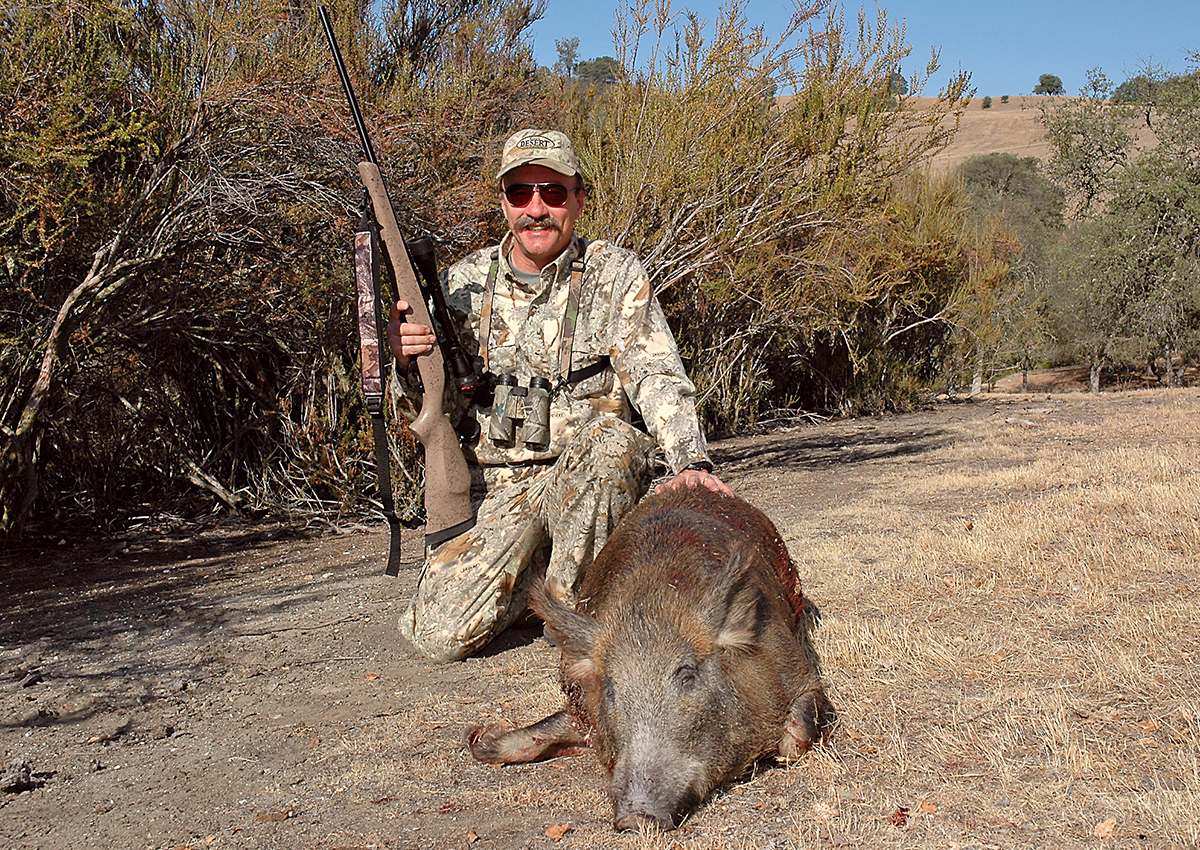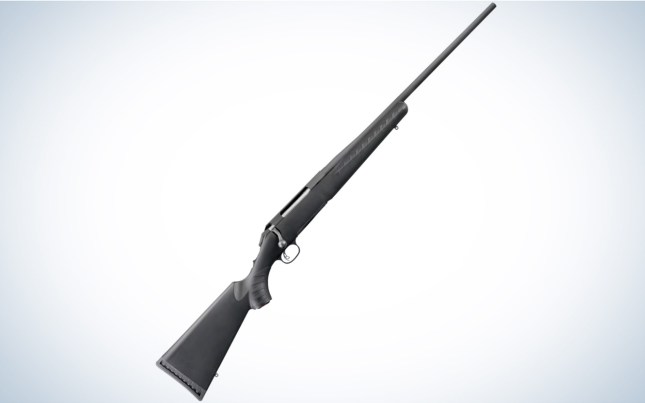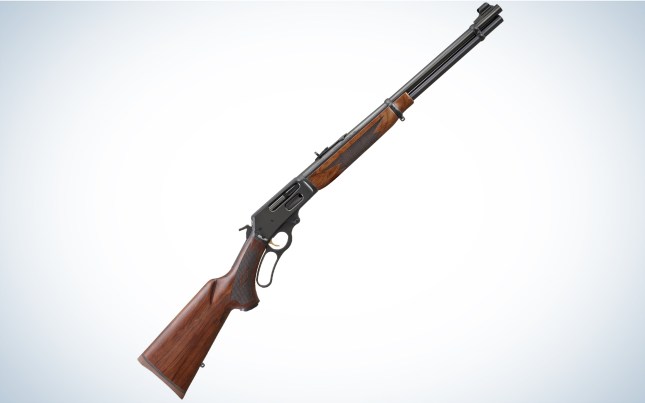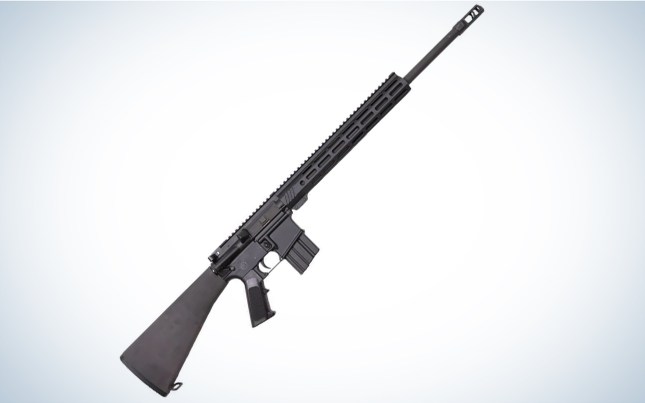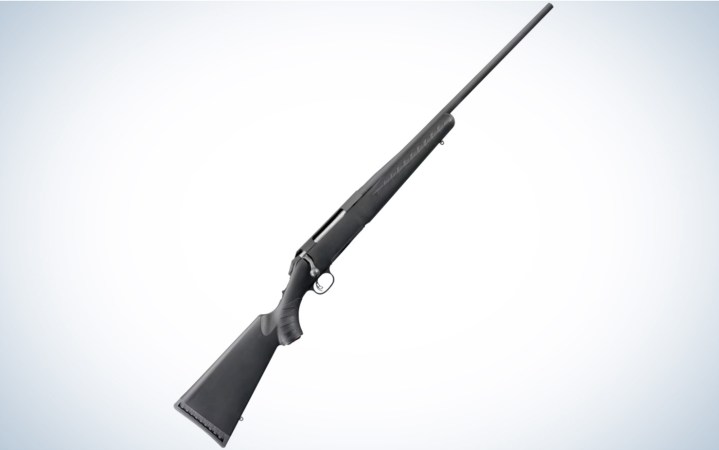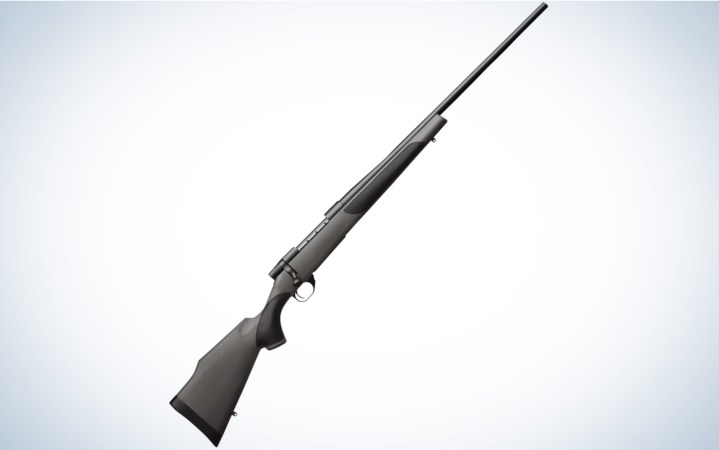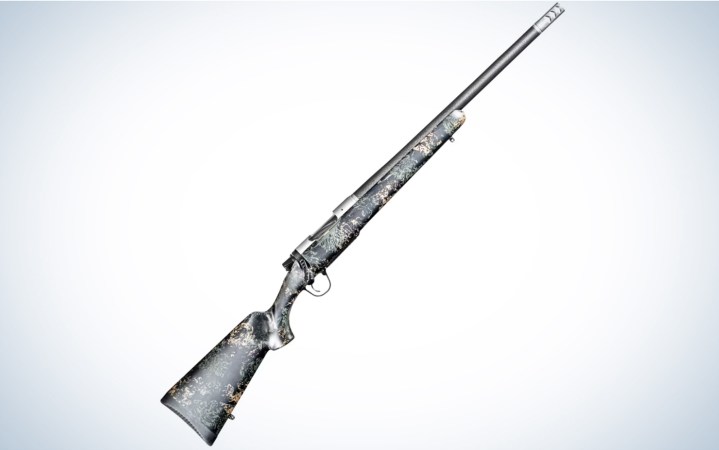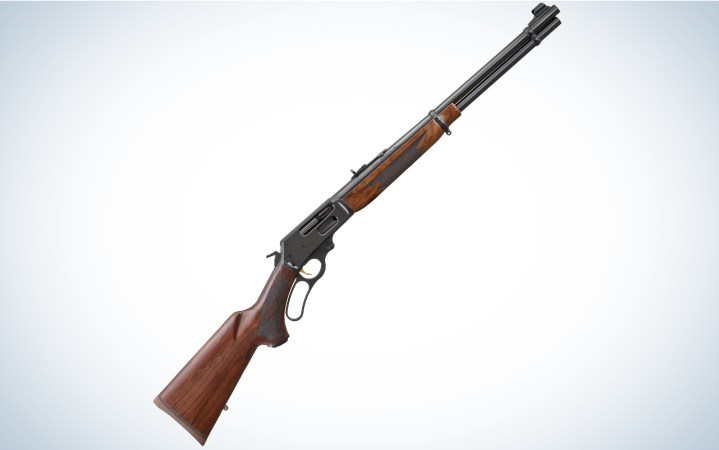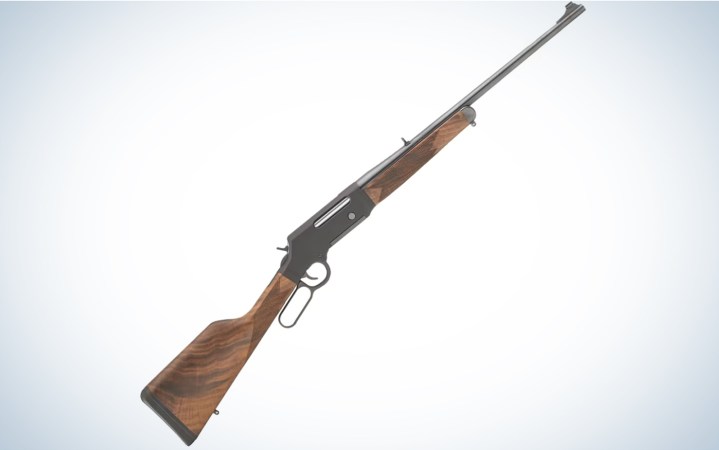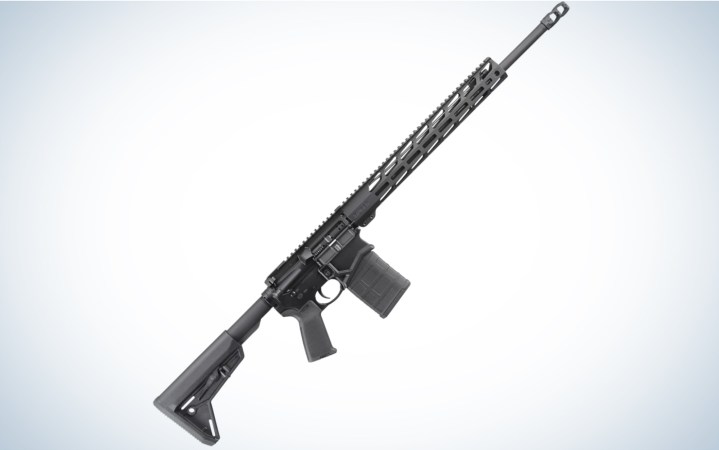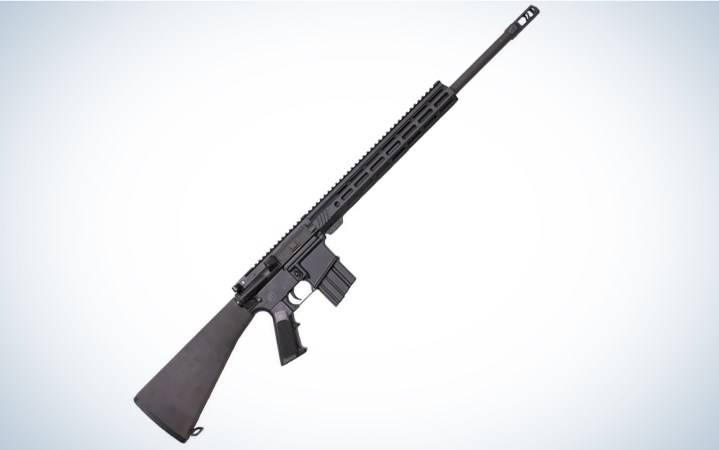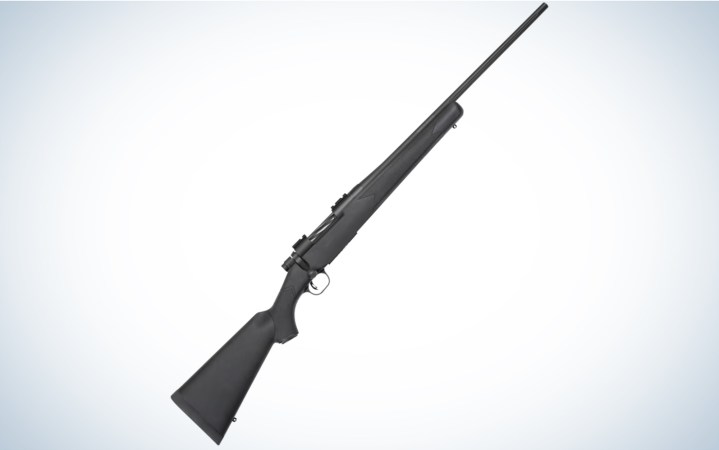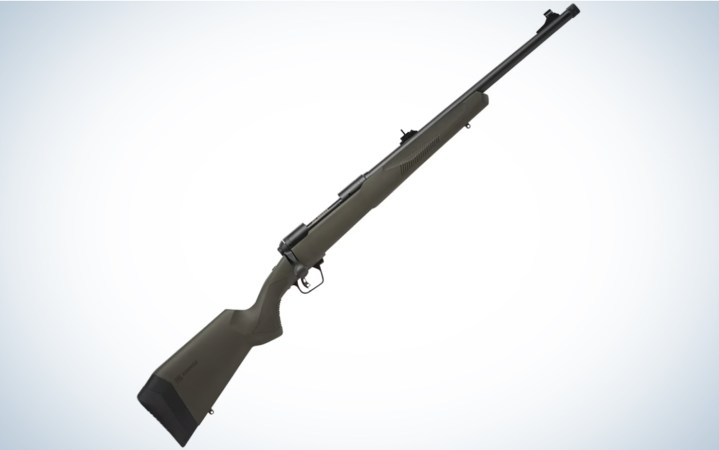We may earn revenue from the products available on this page and participate in affiliate programs. Learn More ›
Choosing the best gun for hog hunting could be as simple as grabbing your favorite deer rifle, but where’s the fun in that? Any excuse to buy a new rifle is a good excuse, and there are plenty to be found when hunting hogs. They are pursued across a wide variety of terrain using a host of hunting strategies.
You might glass from high ground and execute a stalk ending with a long shot. You might take a stand and intercept hogs as they move between bedding and feeding areas, or ambush them when they go to water. You can station yourself downwind of bedding areas and have a pal make a drive through cover, pushing hogs toward you. You can shoot them at spitting distance while behind dogs, or sit in a deer stand and pick them off when they come to feeders. Where legal, you can pursue them at night using an AR with a thermal scope.
I’ve been killing hogs for four decades and have taken them using all of these methods. I killed one with a knife. One of the biggest hogs I have ever shot was taken with a muzzleloader. The salient point is that there is no perfect hog hunting gun for every circumstance. A quick-handling woods gun may not be best for open country, and a flat-shooting rifle with a high-powered scope may not be ideal for rooting hogs out of thick cover. If you’re looking for a new hogzilla terminator, we’ve got you covered with this list of the best guns for hog hunting.
- Best Affordable: Ruger American
- Best Mid-Priced: Weatherby Vanguard
- Lightweight Stalker: Christensen Ridgeline FFT
- Lever Action: Marlin 336 Classic
- Extended-Range Lever Action: Henry Long Ranger
- AR-10: Ruger SFAR
- AR-15: 450 Bushmaster BOAR
- Straight-Wall Cartridge Rifle: Mossberg Patriot
- Iron-Sighted Bolt Action: Savage 110 Hog Hunter
- All Purpose: Browning X-Bolt Speed
How I Chose the Best Guns for Hog Hunting
My first consideration in compiling this list was to match rifles to specific hunting methods. This is by no means a definitive list, as there are many guns that will work well in each category. These are simply my current choices based on decades of hog-hunting experience and shooting all but two of the rifles, which are new models that have good reviews from my colleagues.
With a couple of exceptions, this list is weighted toward more affordable rifles, or guns that offer a lot of value for the money, because many hog hunters don’t necessarily need or want to spend a lot of money on their rifles.
Read Next: Hog Hunting, a Beginner’s Guide
Best Guns for Hog Hunting: Reviews & Recommendations
Best Affordable: Ruger American
Best Affordable
Ruger American
Sure, there are cheaper rifles out there, but the Ruger American remains a top seller in the budget-friendly category because it’s light, rugged, accurate, and available in enough variations to please any hunter.
The standard model has a black synthetic stock and detachable magazine, and is chambered for seven popular cartridges. The American Predator expands chambering choices to 12 cartridges and is available with a moss green or black synthetic stock, a threaded barrel and a number of magazine options. The American Ranch Rifle has a tan synthetic stock and is chambered in 5.56 NATO, 7.62×39, 6.5 Grendel, 350 Legend, and 450 Bushmaster.
The American Go Wild rifle, with a Go Wild I-M Brush camo stock, is a personal favorite of mine – or it used to be until my son hinted that it would make a fine birthday gift. The Go Wild is offered in 11 chamberings, including the new 7mm PRC. There’s also an American Hunter model, featuring an adjustable Magpul stock, and a Compact model.
All of these rifles are built around a simplified action with a full-diameter, one-piece bolt with three locking lugs, dual cocking cams and a 70-degree bolt throw for ample scope clearance. Barrels are cold hammer forged and free floated via a bedding block system used in all but the Hunter models. All versions have a tang-mounted safety and the Ruger Marksman Adjustable trigger.
I’ve found Ruger American rifles to be consistently accurate, with several tested models producing sub-MOA average three-shot groups with specific loads.
Best Mid-Priced: Weatherby Vanguard
Best Mid-Priced
Weatherby Vanguard
I bought my first Weatherby Vanguard rifle, chambered in 270 Win., nearly 40 years ago. I sold that gun to buy another Vanguard chambered in 257 Wby. Mag., and two other Vanguards in other chamberings live in my safe. I long ago lost count of the number of hogs killed with these guns.
My Vanguards all print sub-MOA groups with ammo they like. Prices have gone up with inflation, but you can buy most models for less than $1,000. Weatherby offers 19 versions in a wide range of chamberings, including some of the Weatherby magnum cartridges, as well as a variety of stocks, finishes and barrel lengths. Stocks on most models retain Weatherby’s Monte Carlo comb. Weights range from 6.5 pounds to 7.5 pounds.
READ NEXT: Best Mid-Priced Rifles
The heart of the rifle remains the sturdy, machined Vanguard action, mated to a hammer-forged barrel. It employs a fully shrouded, fluted, one-piece machined bolt that has a 90-degree lift. It cycles quite smoothly. It has large, dual opposed locking lugs, a standard plunger ejector and a claw-type extractor.
Early Vanguards had lackluster triggers, but Weatherby long ago fixed that with a two-stage trigger that’s adjustable within a range of 2.5-3.8 pounds. The guns have a three-position, rocker-style safety that locks the bolt down in the rearmost position, but allows you to safely cycle rounds through the action with the safety in the middle, engaged position.
Vanguards don’t have the same panache of Weatherby’s Mark V rifles, but neither do they have their price. They are simple, rugged, reliable, and accurate rifles that will last season after season.
Lightweight Stalker: Christensen Ridgeline FFT
Lightweight Stalker
Christensen Ridgeline FFT
The Christensen Ridgeline FFT is the most expensive rifle on this list, but it costs half as much as Christensen’s most expensive model. The rifle I tested, chambered in 6.5 Creedmoor, delivered some three-shot groups as small as 0.20 inches — or a single ragged hole — and is one of the most accurate hunting rifles I’ve ever tested.
That’s remarkable considering the rifle weighs just 5.3 pounds with its carbon fiber stock and carbon fiber-wrapped 20-inch stainless barrel. FFT stands for Flash Forged Technology, a new carbon fiber stock design using single-shell construction similar to that used in race cars. Additional weight was shed using aluminum bottom metal, an FFT bolt knob, skeletonized bolt handle and FFT hinged floorplate for the internal magazine.
The rifle has a precisely machined 416 stainless-steel push-feed action that cycles smoothly and is bedded with steel pillars. Button-rifled barrels have match-grade chambers, and muzzles are threaded and tipped with a stainless, side-baffle muzzle brake. The gun employs an excellent Trigger Tech trigger, and has an oversized trigger guard.
The FFT is chambered for 22 different cartridges ranging from 22-250 Rem. to 300 RUM. In addition to most common cartridges, some interesting stops along the way include 6.8 Western, 26 Nosler, 280 Ackley Improved, 28 Nosler, 30 Nosler, and the new 7mm PRC. If you aspire to own one quality rifle that’s accurate and light enough to go anywhere, take a hard look at the FFT. Read Tyler Freel’s full review of the Christensen Ridgeline FFT here.
Lever Action: Marlin 336 Classic
Lever Action
Marlin 336 Classic
One of the best guns for hog hunting is still a handy lever action rifle, and you can’t talk about lever guns without mentioning Marlin Firearms. Marlin fans waited anxiously to see what Ruger would do after acquiring Marlin from Remington, and they weren’t disappointed when Ruger resurrected the Model 1895 to rave reviews. Now Ruger has done it again with the new Model 336 Classic.
As its name implies, the 336 was a true classic. An improved version of the Model 1936, the 336 became a favorite in the whitetail woods. The gun is chambered initially in .30-30 Win., which will do the job nicely on hogs at closer ranges. With a side-eject receiver and lever machined from alloy steel, the gun’s six-round tubular magazine loads from a side gate. The gun has a 20.25-inch hammer-forged steel barrel with six-groove rifling and a 1:12 rate of twist. Equipped with a hooded ramp front sight with a brass bead and an adjustable semi-buckhorn rear sight, the gun is also drilled and tapped for mounting an optic.
The 336 is aesthetically pleasing with a gold trigger and an American black walnut stock with nicely executed checkering, a Marlin horse and rider medallion in the grip cap and a soft rubber recoil pad. In addition to a traditional hammer half-cock notch, the gun has a manual cross-bolt safety.
Happily, Ruger’s acquisition of Marlin has brought improved manufacturing processes and a renewed focus on quality control, which suffered during Marlin’s final years under Remington. Marlin’s biggest challenge going forward will likely be meeting the pent-up demand for guns like the 336 Classic.
Extended-Range Lever Action: Henry Long Ranger
Extended-Range Lever Action
Henry Long Ranger
If you like the handiness of a lever-action rifle but want something with greater reach, you may want to consider the Henry Long Ranger rifle. Unlike most traditional lever guns, the Long Ranger is chambered for .223 Rem., .243 Win., 6.5 Creedmoor, and .308 Win. short-action cartridges, which are fed from a steel, flush-fit detachable magazine.
Inside the lightweight aluminum alloy receiver, you’ll find a geared action that drives a six-lug, chromed-steel bolt into the rear barrel extension for a strong, solid lock-up. Blued-steel, sporter-contour barrels are free floated and measure 20 inches on all guns except ones chambered 6.5 Creedmoor, which have 22-inch barrels. The gun still has a traditional lever and external hammer, but you’ll find no external safety on it. Instead, it uses an internal transfer bar safety which prevents the hammer from striking the firing pin until the trigger is pulled. This allows you to safely carry the rifle with a round chambered.
The gun is available with and without iron sights, but this is a hunting rifle, so the flat top of the receiver is drilled and tapped for scope mounting. The rifle has an attractive American walnut stock with precise, laser-cut checkering in the right spots. Weight is about 7 pounds, give or take a few ounces depending on specific flavor.
The Long Ranger’s trigger takes a little getting used to because it has a bit of take-up and stacks before breaking. Once you get a feel for the trigger, the rifle is capable of accuracy rivaling that of many bolt-action guns.
AR-10: Ruger SFAR
AR-10
Ruger SFAR
AR-10 rifles chambered in .308 Win. have long been popular for hunting hogs, but they’ve always had one drawback — most are heavy beasts weighing 8 to 10 pounds. Ruger changed that with the SFAR (small frame autoloading rifle), which trims weight where possible while adding strength where it counts. The result is an AR-10 scaled to an AR-15 footprint, weighing just 7.3 pounds with a heavy-profile 20-inch barrel and even less with a 16-inch barrel.
The SFAR is the lightest AR-10 I’ve tested combining so many well-designed features at an affordable price. The gun uses a new bolt carrier group designed to withstand the pounding from .308 Win. loads. It has a chrome-lined 8620 steel bolt carrier, and the bolt and barrel extensions are made of a special alloy for added strength. The staked gas key is nitride-processed, and a titanium firing pin has a physical vapor deposition coating for durability. The bolt has dual ejectors and a beefy extractor, and there are venting ports in the upper receiver, barrel extension and bolt carrier to direct gas away from the shooter’s face.
The gun comes with Ruger’s Boomer muzzle brake, which does a great job of reducing recoil. Barrels have 5R rifling with a 1:10 rate of twist, and muzzles are threaded. Furniture includes a Magpul MOE SL stock, a MOE grip, and a slim 15-inch M-LOK handguard. The rifle comes with a 20-round Magpul PMAG magazine, but is compatible with other AR-10 magazines.
The rifle has an adjustable rotary gas block with four settings that allow you to optimize performance, and it’s equipped with Ruger’s two-stage Elite 452 trigger, which is far better than triggers on most factory ARs. My rifle turns in average groups of around one inch with preferred ammo, and the SFAR is now my go-to AR-10 for hunting hogs.
AR-15: .450 Bushmaster BOAR
AR-15
.450 Bushmaster BOAR
Bushmaster, one of the oldest AR manufacturers, died a quiet death in 2020 when parent company Remington announced that it would no longer produce Bushmaster firearms. Bushmaster trademarks were purchased by a holding company after Remington’s bankruptcy, and Bushmaster now operates as an independent company in Carson City, Nevada, with a renewed commitment to quality control, which wasn’t exactly a strength during Big Green’s final years.
Bushmaster’s newest rifle, the .450 Bushmaster BOAR (as in Beast Of A Rifle), is a hog hunter’s dream. It’s chambered for the popular .450 Bushmaster cartridge, a big-bore option that turns an AR-15 into a thumper. It launches heavy bullets, mostly in the 245-grain to 300-grain range, at decent velocities, but they drop like rocks past 200 yards. That matters little to hunters who typically shoot hogs at close range. The .450 Bushmaster cartridge kills a ton of hogs across the country each year.
The BOAR has a 20-inch, 4150 chrome moly vanadium barrel with a 1:8 twist and a salt bath nitride finish, and the muzzle is tipped with a Snake Charmer muzzle brake to help tame the 450 Bushmaster’s considerable recoil. The rifle weighs just 7.3 pounds and is highly maneuverable.
Equipped with an A4 flat top upper receiver, the gun has a DM2S two-stage trigger, carbine-length gas system and 14-inch BFI MLOK handguard. Durability and reliability are enhanced with the use of a salt bath nitride-protected bolt carrier group and an MPI-tested bolt. Furniture includes a Magpul UBR GEN2 collapsible stock, Magpul MOE Grip and Magpul MOE enhanced trigger guard. The gun comes with a five-round BFI aluminum magazine. For a feature-loaded AR-15, this new rifle has an attractive price tag of about $1,170.
Straight-Walled Cartridge Rifle: Mossberg Patriot
Straight-Walled Cartridge Rifle
Mossberg Patriot
If you’re one of the hunters in the growing number of states that have relaxed shotgun-only rules to allow the use of straight-wall cartridges, Mossberg offers several versions of the affordable Patriot bolt-action rifle, like the Patriot Synthetic or Walnut, chambered in .350 Legend and .450 Bushmaster.
Judging by the stock on the rifle I used last year to take two giant black bears in Alberta, Mossberg appears to have upgraded the quality of the wood on the Walnut model. It had more figure and color than I would ever expect from a rifle in this price category. Affordable wood-stocked guns are increasingly difficult to find, but but the Patriot is one good exception. The walnut Patriots cost less than $700, which is only about $200 more than the Patriot Synthetic.
Standard features include drop-box magazines (4+1 capacity), a spiral-fluted bolt, pre-installed Weaver-style scope bases and an adjustable trigger. The trigger on the rifle I hunted with was quite good. It broke crisply at a pull weight of 2 pounds, 1 ounce, which is something of a rarity for cheaper factory rifles, and the gun proved to be quite accurate. Rifles chambered for .350 Legend have 22-inch barrels, while guns in .450 Bushmaster have 20-inch barrels that are fluted and threaded on some versions.
Additional straight-wall cartridge models include a Super Bantam youth version and a Patriot Predator 450 Bushmaster, which has a tan synthetic stock, a 16.25-inch threaded barrel and a factory installed picatinny rail for mounting optics.
Iron-Sighted Bolt Action: Savage 110 Hog Hunter
Iron-Sighted Bolt Action
Savage 110 Hog Hunter
The problem when hunting with highly attractive and expensive rifles that are topped with expensive optics is you can spend half your time in the field worrying about damaging them. The Savage 110 Hog Hunter is not one of those guns. It’s only slightly more attractive than the animal it’s named for, and it’s equally tough.
Equipped with adjustable iron sights (you can mount an optic if you wish), the Hog Hunter is designed for close work, and is available in only three chamberings: .223 Rem. .308 Win. and .350 Legend. Built on the time-proven 110 action, the rifle has a 20-inch, medium-contour barrel that’s threaded to accept muzzle brakes or suppressors. With an overall length of just over 38 inches, the relatively light rifle (7.06 pounds) is pretty handy. The dark green synthetic stock has nice ergonomics and is adjustable for length of pull.
The rifle employs a flush-fit detachable box magazine, with a capacity of four rounds. The gun features the much-copied adjustable Savage AccuTrigger and a three-position, tang-mounted safety. The bolt, with a 70-degree throw, has an oversized handle for quick operation.
The 110 Hog Hunter is designed to get down and dirty. It earns its keep bouncing around in trucks and ATVs and being subjected to harsh treatment. It’s also one of the cheapest rifles on this list.
Best All Purpose: Browning X-Bolt Speed
Best All Purpose
Browning X-Bolt Speed
The rifle that vaulted Browning’s X-Bolt line to prominence, the X-Bolt Hell’s Canyon Speed rifle, has now evolved into the X-Bolt Speed rifle. It is, to my eye, a more attractive gun. and it’s much more affordable than top-of-the-line X-Bolts. Pound for pound it’s probably the best gun for hog hunting in a variety of situations.
The X-Bolt Speed’s new look incorporates Browning’s signature Ovix camo on the stock and a smoked bronze Cerakote finish on the barrel and action. The bedded, low-profile action uses Browning’s rock-solid X-Lock scope mounting system, which doubles the number of base screws from four to eight. An Inflex reoil pad and radial muzzle brake work in concert to reduce recoil with this relatively light gun. Depending on chambering and barrel length, weight ranges from 6 pounds, 5 ounces to 6 pounds, 13 ounces. With a scope attached, total weight is just right for a general-purpose hunting rifle.
Standard features include fluted and free-floated sporter-contour barrels, detachable rotary magazines that feed rounds in line with the bolt, a two-position top-tang safety and a crisp-breaking, adjustable single-stage trigger. The smooth-cycling bolt has a short, 60-degree throw, and there’s a unique bolt unlock button that allows you to cycle rounds through the action with the safety engaged.
The rifle, available in long- and short-action versions, is offered in 17 chamberings ranging from .243 Win. to .300 RUM. In addition to common chamberings, you can get the rifle chambered 6.5 PRC, 6.8 Western, 280 AI, 28 Nosler, 300 PRC and the new 7mm PRC. Every X-Bolt I’ve ever shot proved to be unfailingly accurate, and that earns the X-Bolt Speed a spot on this list as a great all-purpose hog rifle.
FAQs
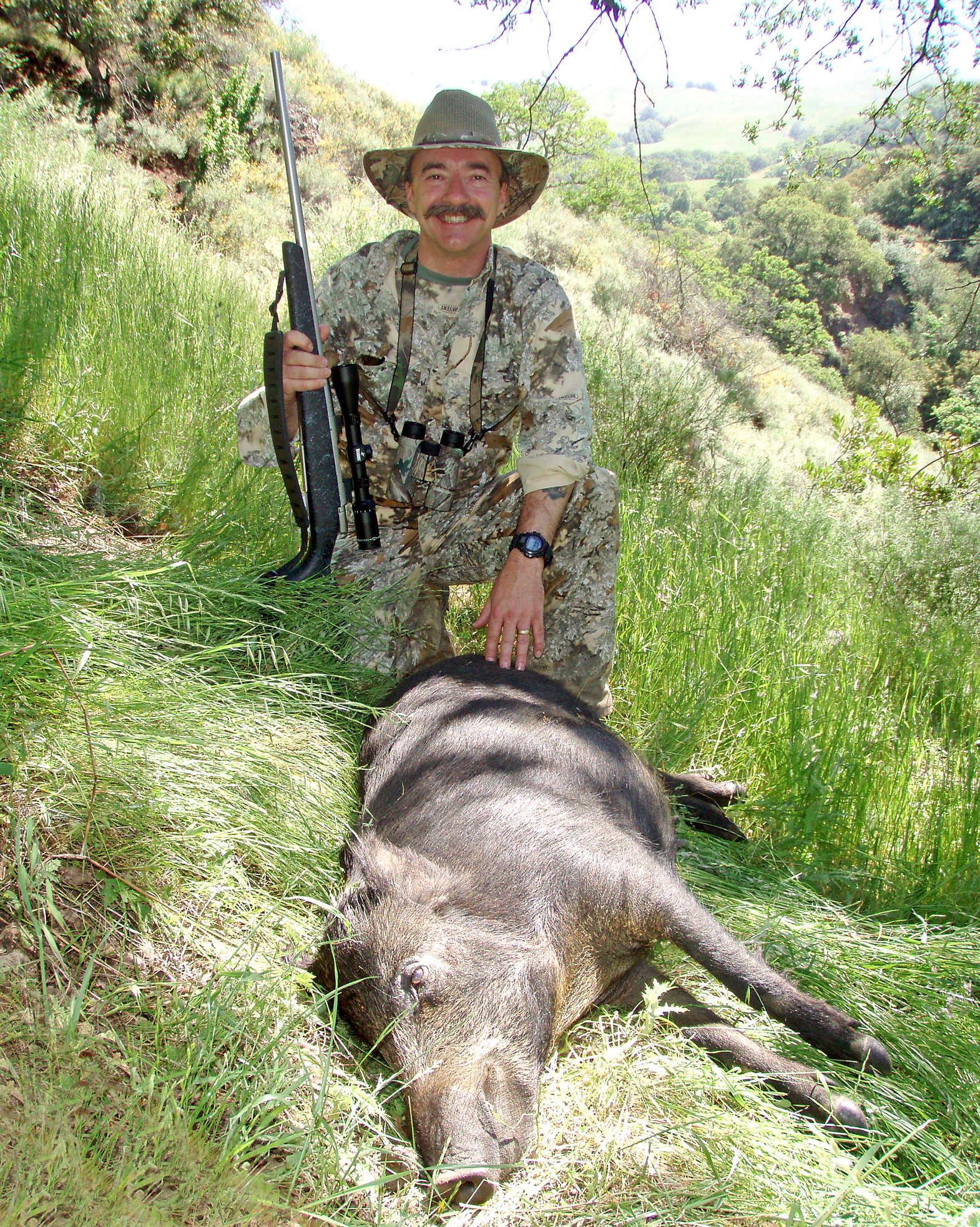
Most any good deer cartridge will do the job, but keep in mind that big boars can be tough to put down and keep down because of the thick cartilage shield protecting their vitals. I’m not a fan of .223 Rem. for hogs. Yes, lots of people kill hogs with the .223 and similar cartridges, often using head shots, but such cartridges are not ideal for many hunting situations. I view the .243 Win. and quarter bores like the .25-06 Rem. as a minimum for hog hunting. It’s hard to go wrong with the best deer hunting cartridges like the 6.5 Creedmoor, .270 Win., .308 Win., and .30-06 Springfield. Cartridge choice is actually less important than choice of bullet. With hogs, you want a bullet that’s going to expand, penetrate deeply, and hold together.
Wild hogs make great table fare, but there’s a profound difference between trophy and tasty. Big boars can be nearly inedible. Sows of any size, or boars weighing 150 pounds or less, are your best bets, but some precautions are in order. Hogs can transmit diseases that you would like to avoid, such as swine brucellosis, tularemia, and trichinellosis. Don’t process any hog that shows signs of illness. Wear rubber gloves and safety glasses when processing meat, wash hands thoroughly afterward, disinfect processing tools and cook meat thoroughly to an internal temperature of 160 degrees. Don’t let this put you off from enjoying wild hog meat. My friends come running when I make a wild hog roast or when I serve up some spicy Italian hog sausage. I even used hog meat to win a chili cookoff in Texas, which is saying something.
Why Trust Outdoor Life?
Since 1898, OL has been a leading authority in testing and reviewing hunting gear, fishing tackle, guns and shooting equipment, and much more. We have more than a century-long history of evaluating products, and we’re now bringing that expertise to online reviews. Our editors are experienced outdoorsmen and women, and most importantly, we’re trained journalists. We prioritize field testing and objective data when reviewing products. We conduct interviews with gear manufacturers and engineers as well as outdoor experts so that our readers have an understanding of how and why a product works—or doesn’t.
Advertising does not influence our gear reviews and it never will. While we always focus our coverage on standout products—because we want our readers to be aware of the latest and greatest gear—we also cover the flaws and quirks of any given product.
Final Thoughts on the Best Guns for Hog Hunting
As with most game animals, shot place is the key to bringing home the bacon. I’m not a fan of head shots on hogs, although they’re commonly used. Head shots are obviously not a good idea if you want to retain a trophy skull. Also, the margin for error is small, and the risk of inflicting a maiming wound is significant. No animal deserves that. Much the same can be said for neck or spine shots, unless you have the skill to place these shots precisely from a rifle that’s very accurate. For reliable results, punch hogs through the heart and lungs with a proper expanding bullet, or pin them through the shoulders with a monolithic copper bullet. Always be prepared to place a quick follow-up shot.
- Best Affordable: Ruger American
- Best Mid-Priced: Weatherby Vanguard
- Lightweight Stalker: Christensen Ridgeline FFT
- Lever Action: Marlin 336 Classic
- Extended-Range Lever Action: Henry Long Ranger
- AR-10: Ruger SFAR
- AR-15: 450 Bushmaster BOAR
- Straight-Wall Cartridge Rifle: Mossberg Patriot
- Iron-Sighted Bolt Action: Savage 110 Hog Hunter
- All Purpose: Browning X-Bolt Speed
